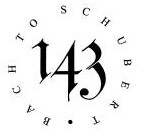


We hope you will find on this page all the information you need about Orchestra 143!
Orchestra 143 was founded in December 2002 to fill a perceived gap in the musical scene on Sydney's North Shore. While it was possible to find high quality performances of chamber music and of the large orchestral repertoire, there were few if any ensembles regularly performing music for smaller orchestra. Hence the formation of Orchestra 143, which is devoted to the music of the baroque, classical and early romantic period – specifically, from 1685 (birth of Johann Sebastian Bach) to 1828 (death of Franz Schubert). Orchestra 143 seeks not only to perform works by the great composers of this period – Bach, Handel, Vivaldi, Haydn, Mozart, Beethoven, Mendelssohn, Schubert – but also to acquaint its audiences with interesting music by lesser known composers such as C.P.E. Bach, Corelli, Arriaga, Bellini, Boyce, Stamitz and Wassenaer.
The last Orchestra 143 concert was given in November 2014. At the time of writing, no future concerts are planned. This page now serves as an archive of the many wonderful performances given by Orchestra 143 in the course of 12 years!
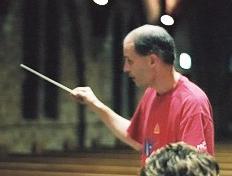
The founding and chief conductor of Orchestra 143 is David Angell. As well as Orchestra 143, David conducts the Bourbaki Ensemble, plays viola in various orchestras and chamber groups, co-wrote and conducted a film soundtrack heard in Sydney and London, has acted as conductor or 'pit muso' in numerous musical theatre productions, is the editor of a revised score of the Concerto for Strings by Margaret Sutherland, has contributed translations of Russian and Italian poetry to the Lied and Art Song Texts website… and more!
Having finally recovered from the planning and execution of our Mozartathon (click here for a report), we have managed to organise another concert before 2014 draws to an end. This performance will take place on Sunday 23 November 2014, commencing at 2:30 pm, at our Mozartathon venue of East Lindfield Community Hall, 9 Wellington Road, East Lindfield. We trust nobody will object to the absence from the programme of any symphonies by Mozart…
… but just in case, we have made up for it by including two by Haydn. No.84 and No.87 come from the time when Haydn's fame, formerly localised at Eszterhaza, was beginning to spread widely across Europe, and belong to a set of six especially written for performance in Paris. The programme will also include our good friend Steve Meyer playing a cello concerto by the inspiringly eccentric CPE Bach. The slow movement of the concerto, with its striking alternation of stark tutti and expressive solo textures, startlingly anticipates Beethoven's G major piano concerto. A brief string work by Vivaldi completes the programme.
On Sunday 2 December 2012, Orchestra 143 gave its tenth anniversary concert in Robertson, in the Southern Highlands of New South Wales. We are delighted that Irina Pollard and Greta Lee were there to record the weekend. (Click on pictures for larger versions – opens in new tab or window.)
A number of participants in the concert travelled to Robertson on Saturday 1 December and spent the day enjoying the hospitality of O143 founders Jim and Alyson, and playing chamber music.
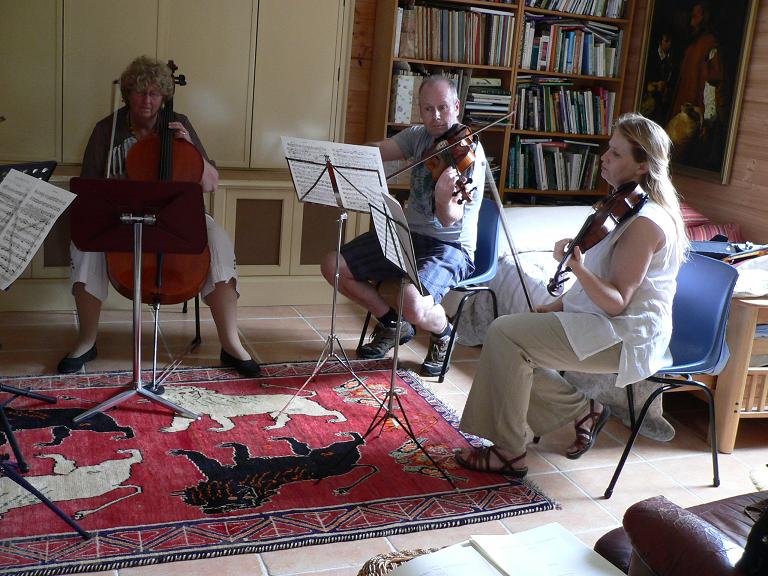 |
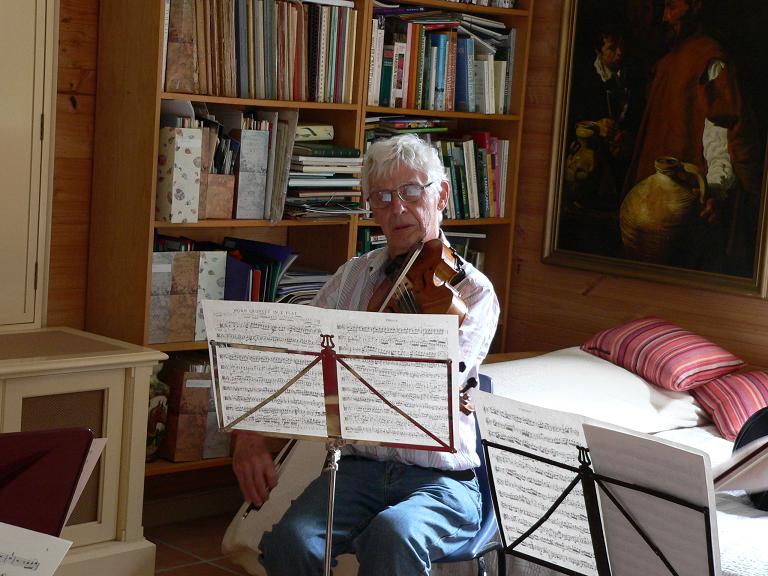 |
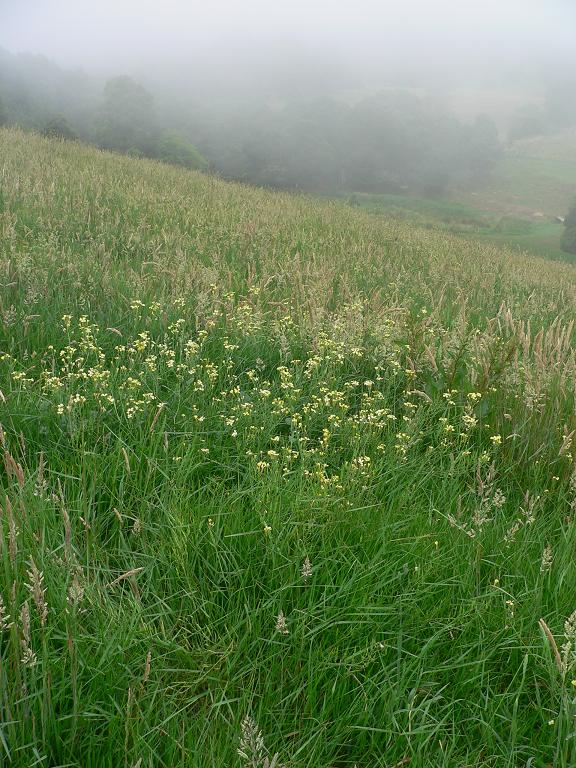 |
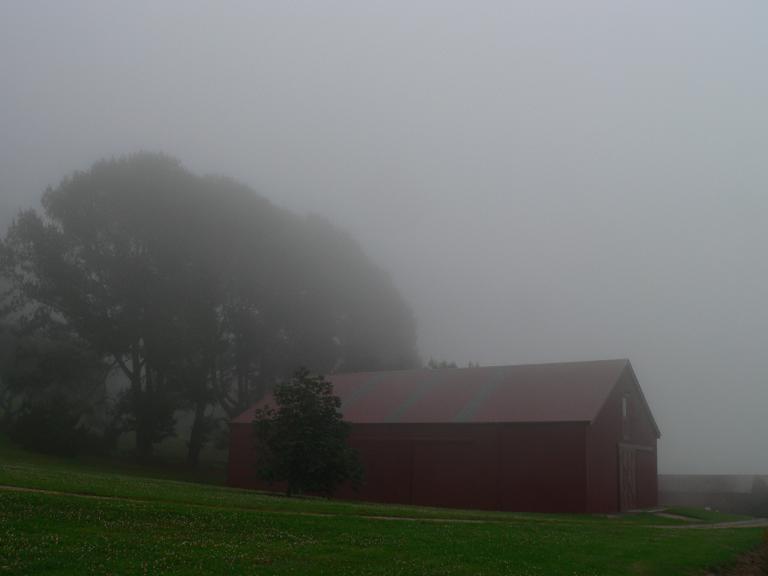 |
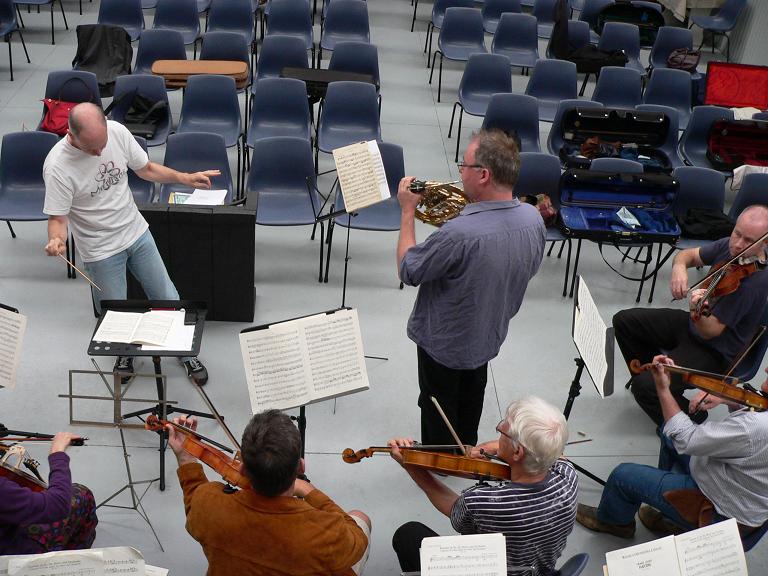 |
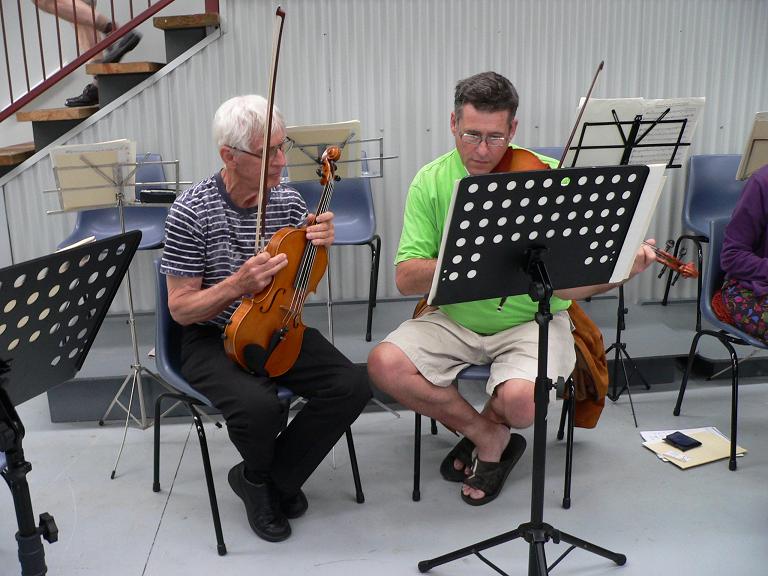 |
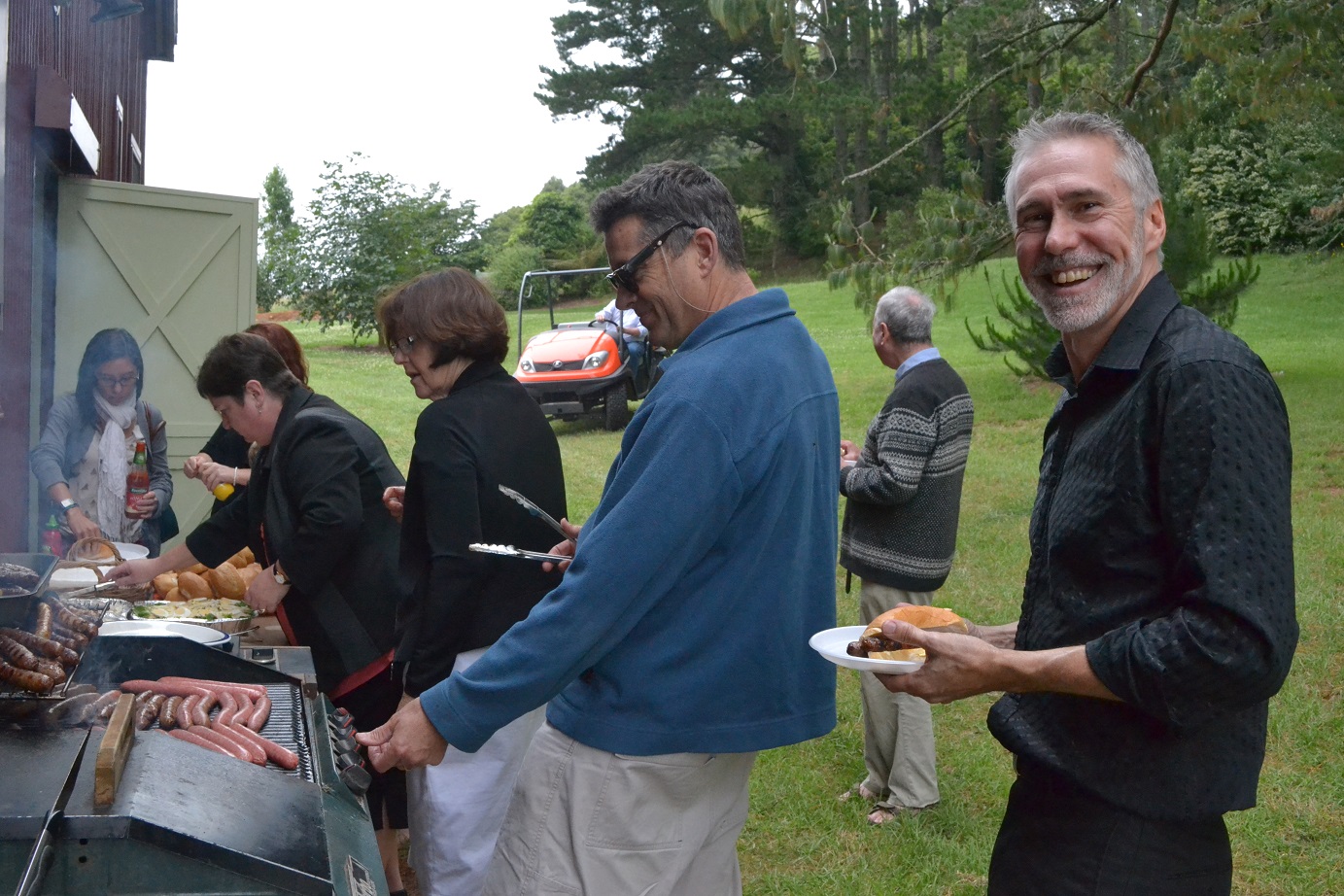 |
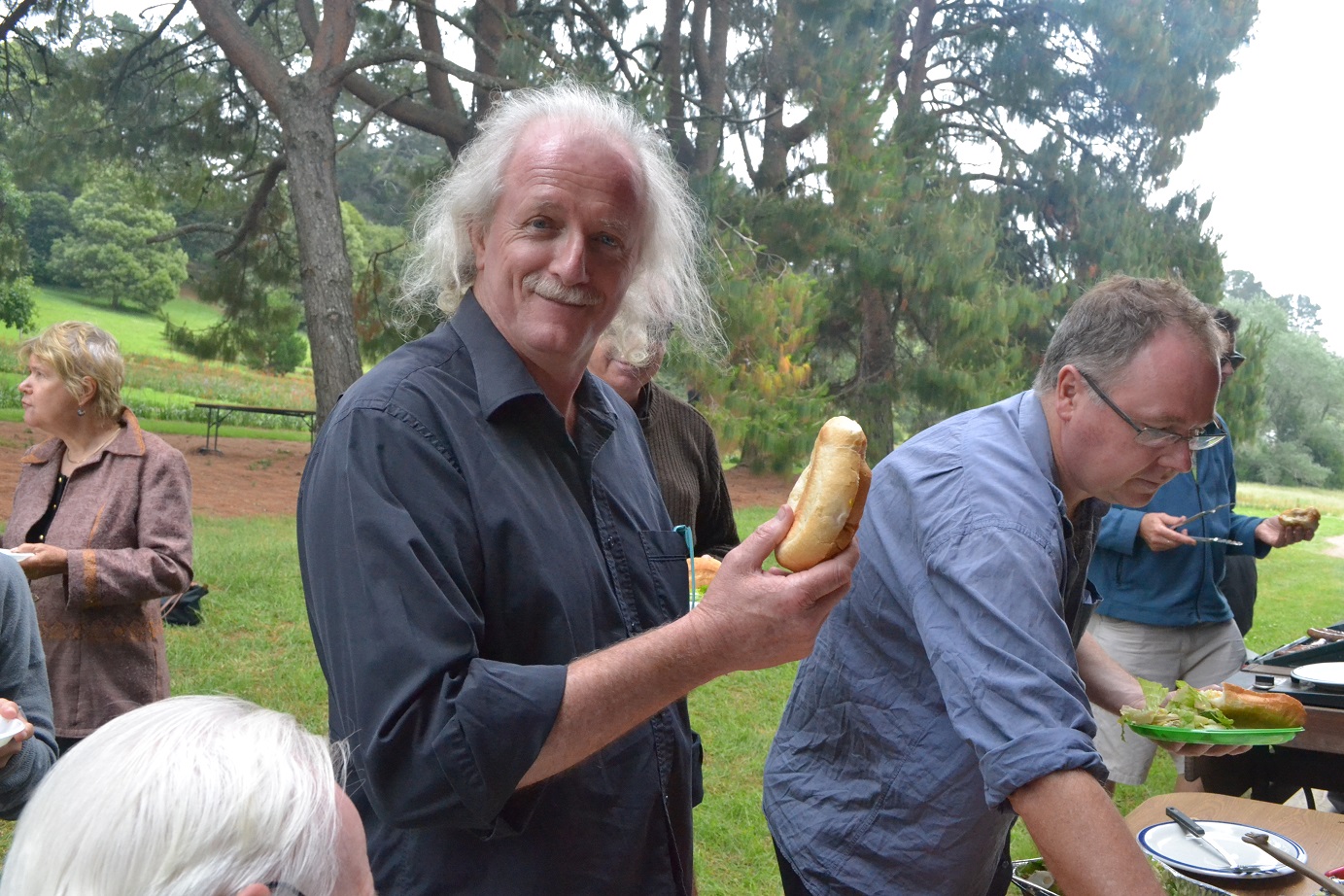 |
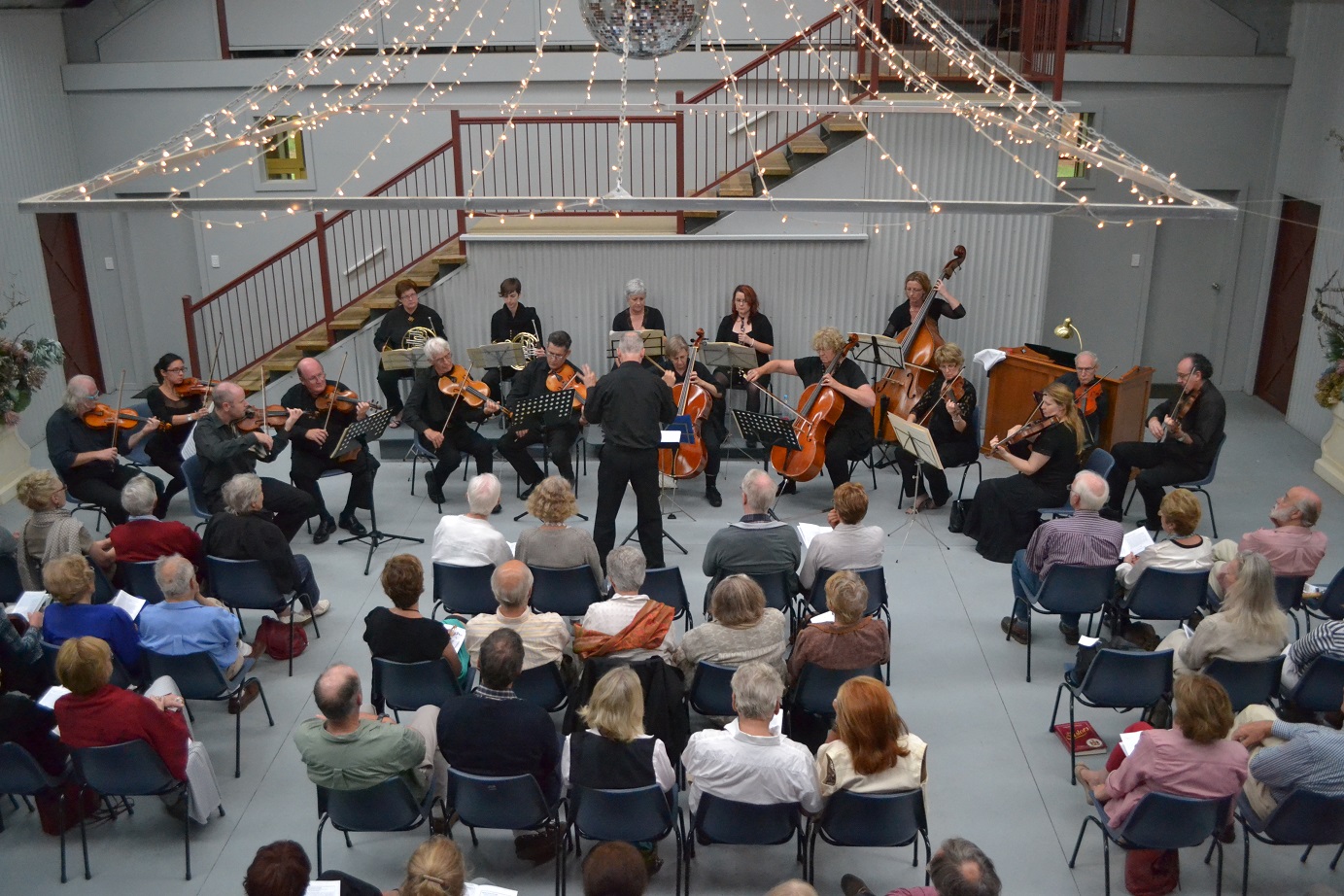 |
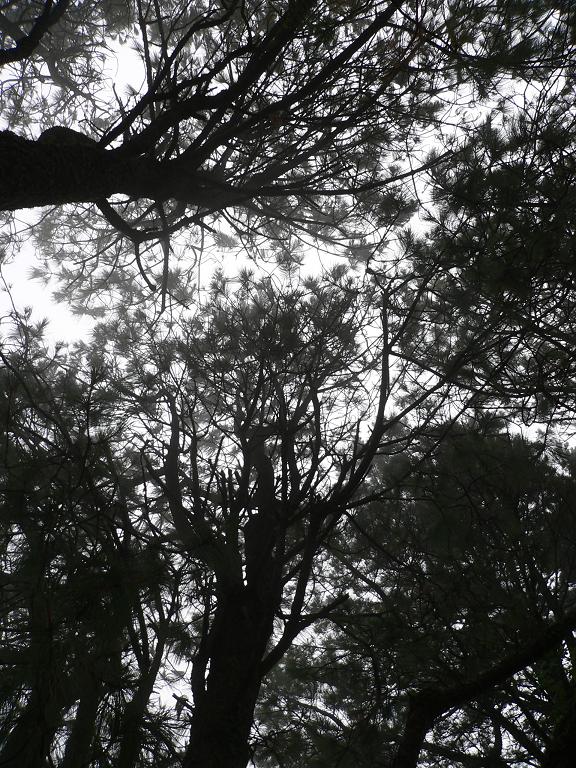 |
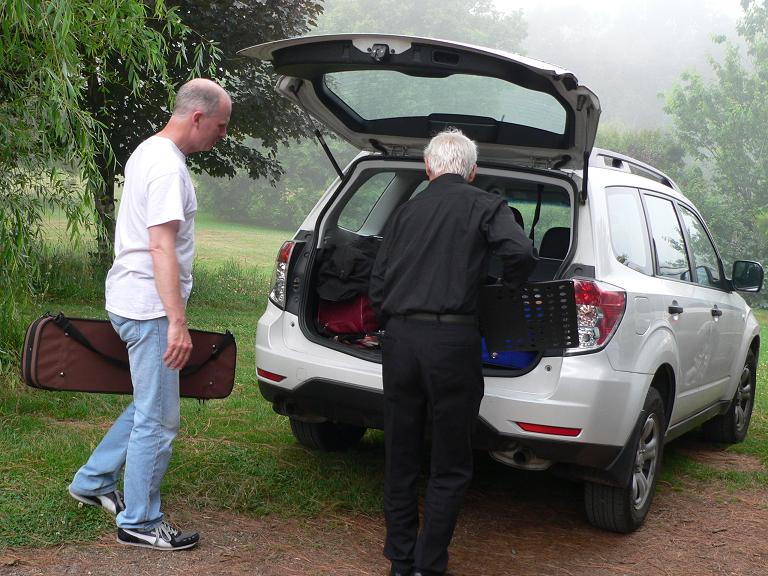 |
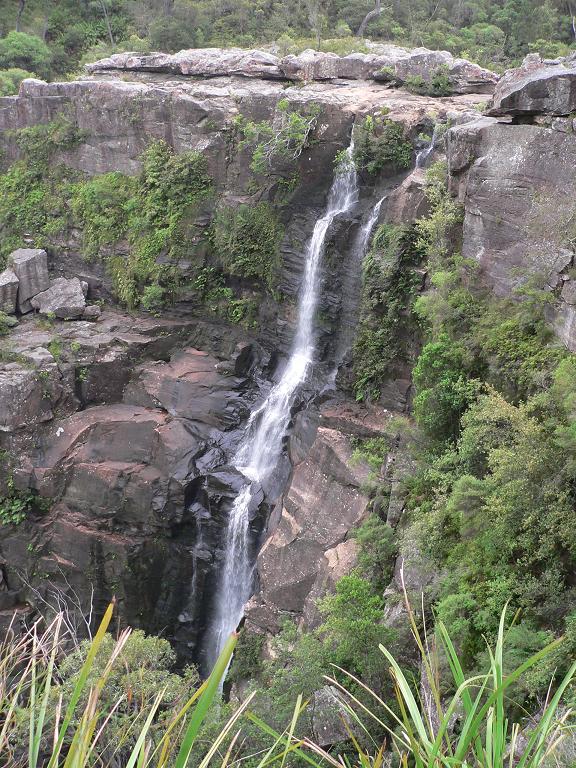 |
In the East Lindfield Community Hall on the weekend of 28 February–2 March 2014, Orchestra 143 presented a Mozart symphony marathon, starting with Symphony No.1 on Friday evening and following a somewhat circuitous path to Symphony No.41 on Sunday evening.
We began our odyssey on a somewhat gloomy Friday evening, officially still in summertime but not looking much like it. A rather scanty audience had gathered to hear some of Mozart's lesser known symphonies, as well as the famous no.25 and no.29. Some of those in the audience were still there two days and five concerts later, by which time they had been joined by a large and appreciative crowd. As the majestic closing chords of Symphony no.41 brought our Mozartathon to its conclusion, the audience rose to its feet to applaud the performers. Those of us on stage were just glad to have accomplished a complete survey of one of the greatest series of works by a single composer in the Western musical repertoire.
Was it worth it? Well, at times it seemed to have all the advantages of beating your head against a brick wall – it just feels so good when you stop – but of course there was much more to it than that. Besides having the opportunity to perform Mozart's well-loved late great symphonies such as no.40 and no.41, it was fascinating to become acquainted with some of the unknown marvels to be found among his earlier compositions. One could recognise the rhythmic and melodic "fingerprints" of Mozart's younger days continuing into his maturity, and could gain a real sense of Mozart's progression from an amazingly talented kid to a truly great composer. Not by any means a uniform progression: some of the lesser known works could only be charitably described as "near misses": but in its own way, this only served to make the project as a whole even more interesting.
There were mishaps along the way: with a programme of twelve hours of music in a weekend, it was only to be expected. The search for missing first violin parts among the second violins' music provided, if nothing else, a welcome couple of minutes' relaxation: with about 10000 pages of music to handle, it was amazing it didn't happen more than once. And overall, the standard of performance was unbelievably high. All the performers drew on their musical experience and instincts, as well as maintaining the highest degree of concentration, in giving magnificent readings of music which had had only the briefest rehearsal. Indeed, of the five symphonies performed in our final session, we can now reveal (it did not seem fair to mention it to the audience at the time) that four were not rehearsed at all.
Many people put a lot of work into making the Mozartathon happen. For all sorts of things from obtaining music to booking venues to providing refreshments to finding players, we would like to thank Emlyn, Roger, Meghan, Cate, Jim, Alyson, Justin, Natasha, Andrew, David, and most of all Derek. Thanks everyone, it wouldn't have happened without you! We are also delighted to acknowledge that the original idea for this project came from The Angel Orchestra and their conductor Peter Fender, who presented the complete Mozart symphonies in Islington, London, on the very same weekend.
Our final concert for the 2013 season celebrated a baroque Christmas.
Three Christmas works from the Italian baroque, as well as the most famous of Vivaldi's numerous flute concertos, and five non–Christmassy but rather jolly dances by Mozart, the first a decidedly chirpy arrangement of the aria "Non più andrai" from Figaro.
Two of the best loved symphonies from the classical period, together with a glance forward to the early romantics, as well as another back to the late baroque.
A concert given at Turramurra in August, and at Robertson for the Sydney and Southern Highlands Music Club in December. This concert marked the tenth anniversary of the inaugural Orchestra 143 performance in December 2002.
In accordance with its celebratory theme, these concerts included repeat performances of Boccherini's La Casa del Diavolo symphony, which we presented to great acclaim in 2010, and of a William Boyce symphony from our very first concert. We also continued our exploration of the symphonies of Joseph Haydn, taking on his No.57; and we welcomed soloist Graham Nichols to play not one but two of Mozart's marvellous horn concertos!
A programme of music by four members of the best known composing family ever!
Works from the two great strands of Johann Sebastian Bach's works, the cantatas and the instrumental concertos, and music by three of Bach's sons. The CPE symphony displays that composer's penchant for originality in musical construction when its grim and forceful first movement suddenly dissolves into a poised and elegant andante. The G minor symphony by JC is thought to have inspired Mozart's Symphony No.25 in the same key; and the WF sinfonia is marked by a certain measure of eccentricity possibly not altogether unknown among the sons of great men.
Music by Haydn, Mozart and Bach, as well as a spectacular concerto by Karl Stamitz, who was closely associated with the Mannheim Orchestra, probably the most virtuosic ensemble of the mid-eighteenth century.
Eight soloists performing a quartet of double concertos! The works encompass the sublime slow movement and invigorating outer movements of the Bach double violin concerto and the classical freshness of the Cimarosa, together with two of Vivaldi's always sparkling and engaging concertos. The Haydn symphony which rounds out the programme has surprises of its own!
Guest conductor Alastair Duff-Forbes leads Orchestra 143 in a programme of symphonies by Haydn and Mozart, Handel's ever popular sinfonia and a Haydn cello concerto with soloist Steve Meyer.
Though its existence was attested by Haydn's own and other historical records, the actual music of Haydn's C major cello concerto was lost and only rediscovered in the 1950s. Since then it has become one of his most popular works and has been recorded by most of the great cellists. The Symphony No.22, composed within a couple of years of the concerto, has attracted the nickname "The Philosopher" on account of its rather solemn introductory movement. It holds a unique place in the symphonic repertoire in that the entire work calls for a pair of cors anglais to replace the customary oboes. Our programme also features one of Mozart's delightful lesser-known symphonies, and Handel's almost too well known Arrival of the Queen of Sheba.
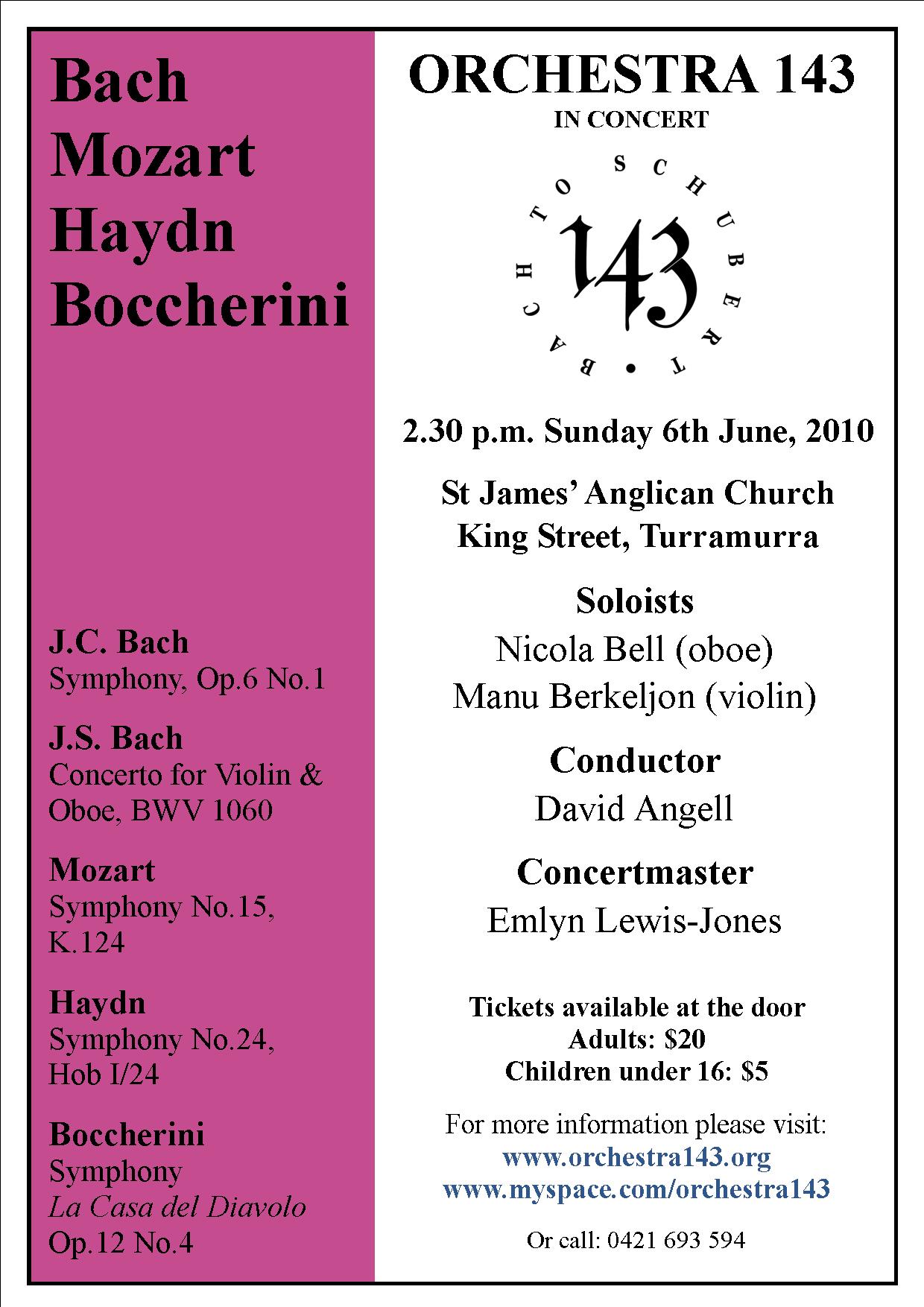
One of Bach's great concertante works, and four nicely varied symphonies from the early to middle classical era.
Handel for voice, Handel for orchestra. Music supposedly by Bach, and music genuinely by Bach. Plus a bit of Telemann.
The H project: a programme of music by composers whose names begin with that letter. (Why not?)
Alex Todicescu is one of Sydney's leading instrumentalists, and we are privileged to have him join us for this concert. Alex will perform the Hoffmeister viola concerto, one of the most fresh and delightful of early classical concertos, and the Hummel Fantasie, based upon a theme by Mozart. Our second Haydn symphony for the year features a movement which the composer denoted "menuet alla zoppa" , which translates as a "limping minuet". The symphony, though little played, contains some of Haydn's quirkiest and most inventive music.
Works for small orchestra by Mozart and Vivaldi, as well as solo and chamber music from the period 1685–1828.
Symphonies by Mozart and Haydn; a Bach cantata; Scarlatti keyboard sonatas transmuted by the English composer Charles Avison.
One of Mozart's delightful middle-period symphonies is contrasted with the darkly chromatic opening of Bach's Cantata No.56, "I will gladly bear the Cross". Charles Avison was an English composer who capitalised on the popularity in his day of Scarlatti's keyboard sonatas by arranging some of them into a dozen concertos for strings. These have been recently rediscovered and have been enthusiastically taken up by many specialist Baroque ensembles.
In this 200th anniversary year of Haydn's death, Orchestra 143 presents two of his Sturm und Drang symphonies. We begin with No.42, a work which sacrifices some of the vivacity of many other compositions from this period of Haydn's life in favour of tightly constructed faster movements and a gentle, hymnlike andantino. In both respects this work looks forward to the great symphonies of Haydn's maturity.
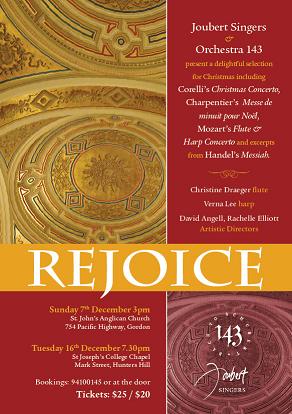
A Christmas concert with the Joubert Singers.
Christmas music from the baroque period – Charpentier's setting of the Christmas midnight mass; a concerto by Corelli, specifically written for the same occasion; and extracts from Handel's greatest oratorio. The Mozart concerto, while not strictly a Christmas work, is delightful, sparkling and admirably suited to the season.
Music by Bach, Pergolesi and others.
Pergolesi's Stabat Mater, for two female voices with string accompaniment, was one of the most universally admired works of the eighteenth century, and still retains its hold on audiences. By turns sorrowful, dramatic and consoling, it is perhaps the most famous of many musical settings of the thirteenth century(?) poem depicting the Virgin Mary's sufferings at the foot of the Cross. The Concerto Armonico, one of a set of six, provides an appropriate companion piece to the Pergolesi, having been for many years attributed to Pergolesi himself. It was only as recently as 1979 that the concerti were proved to have been written in the eighteenth century by one Count Unico Wilhelm von Wassenaer; they were published anonymously since at that time it was socially unacceptable for a member of the nobility to be known as a composer.
Bach's greatest achievements in the field of orchestral music are the six Brandenburg concertos and the four orchestral suites. The first suite, scored for oboes, bassoon and strings, opens with an Overture comprising a majestic opening with a complex contrapuntal sequel, and continues with a set of dances ranging from the familiar minuet and bourrée to the more rarely encountered forlane and passepied. To complete our programme we welcome baritone Matt Thomas to perform arias from Handel's operatic and oratorio repertoire.
Haydn's pioneering endeavours in industrial relations; Mozart's essay in crossing cultural boundaries; and early classical music from England (whatever next??)
Haydn's "Farewell" symphony ends with the players departing one by one until only two violinists are left. With this work Haydn hinted, successfully, to his then employer that it was about time the musicians had a holiday. Mozart's fifth violin concerto incorporates what at the time were regarded as "Turkish" elements, though more academically oriented musicologists would find it difficult to grant him credit for any authenticity. William Herschel, a member of a German-descended British family, wrote over a dozen symphonies in his youth before changing careers to astronomy and being hailed as the discoverer of the planet Uranus.
Vocal and instrumental music from the baroque and early classical periods.
Baroque string concertos by Vivaldi and Geminiani; a divertimento for strings and winds by Mozart; and an extraordinary string symphony by one of J.S. Bach's sons, bridging the gap between the baroque and classical eras. We are delighted to welcome soprano Simone Easthope to perform one of Mozart's best loved motets.
Performances of Handel's Messiah are a staple of the musical calendar during the Advent season. But many sections of the work relate to Easter rather than to Advent or Christmas. This performance selects those parts of Handel's masterpiece, and features guest conductor Rachelle Elliott with the Joubert Singers and soloists.
A Bach cantata, and three symphonies from different nations.
Jauchzet Gott is one of Bach's most brilliant solo cantatas, combining the ringing tones of a soprano voice and an obbligato trumpet. Our programme also includes one of Haydn's endlessly inventive symphonies, and further examples of the form from the pens of an English and a Catalan composer.
Schubert's beloved fifth symphony, and Haydn's musical joke which originated as an overture for a play entitled The Absent-Minded Man. We are delighted to welcome two distinguished members of the Sydney Symphony Orchestra as violin soloists.
Two unusual symphonies, together with classical and early romantic trombone concertos. This concert was given in Sydney and in Singleton.
The 47th of Haydn's 100+ symphonies is famous for its third movement, subtitled "minuetto al roverso", which is an exact palindrome: that is, it would be precisely the same, note for note, if it were played backwards! Haydn's astonishing skill is such that the movement is a perfectly idiomatic classical minuet with no sign of awkwardness arising from the composer's self-imposed restriction. Dittersdorf's symphony imitates the (supposed) styles of German, Italian, English, French and Turkish music. The trombone does not frequently appear as a solo instrument, but we are delighted to welcome James Campbell to play a classical concerto and a delightful Romance by Weber.
Orchestra 143 is delighted to be joined in this concert by Martin Cooke, distinguished Australian singer currently engaged with the Bavarian State Opera.
Vocal and instrumental music from J.S.Bach - an orchestral concerto featuring spectacularly difficult solo parts for horns and violin, and one of his comparatively few cantatas for solo voice - and from Mozart - an early symphony, a selection of operatic arias and the little known comic song "I wish I were the emperor".
Symphonies by Beethoven and by Arriaga, a composer sometimes described as "the Spanish Mozart".
… though, as far as we know, Mozart was never described as "the Austrian Arriaga". His 23rd piano concerto completes the programme.
Soloists representing the four string sections of the orchestra, performing three concertos by classical composers.
An eighteenth-century classical concert from London.
London was a leading centre of musical activity in the late eighteenth century (as it has remained), boasting numerous performances of music both by local and overseas composers. While Purcell and Arne were native Englishmen, J.C. Bach had transferred from Germany to London (via Italy) at an early stage of his career, while Haydn's immense popularity in the British capital was the crowning success of his life.
A concert in celebration of Rossini's 51st birthday!
Although Rossini was born in the eighteenth century, it took him until the age of 212 to reach his 51st birthday – on 29 February 2004.
Four pieces for soloist(s) and orchestra by three of the leading composers of the Baroque era.
A concert devoted to the music of a composer whom many would consider the greatest of all time: ranging from youthful brilliancy...
…to a seriousness and profundity which many composers find only at an age which Mozart never reached.
Orchestra 143 begins an exploration of Haydn's startling middle-period symphonies, written at the court of Eszterhazy which was, in effect, the composer's "laboratory" for development of symphonic technique. Also a sparkling classical clarinet concerto, and two works from the baroque.
(Sssshhh… don't tell anyone… the "Albinoni" is a 20th-century fake and not really baroque music.)
The inaugural concert of Orchestra 143, featuring one of Mozart's most beloved symphonies, together with music by two of the towering figures of the Baroque era, Bach and Vivaldi. In keeping with our programming aims, we also include a marvellous symphony by a less well known composer of the period.
Last update 26 July 2022.